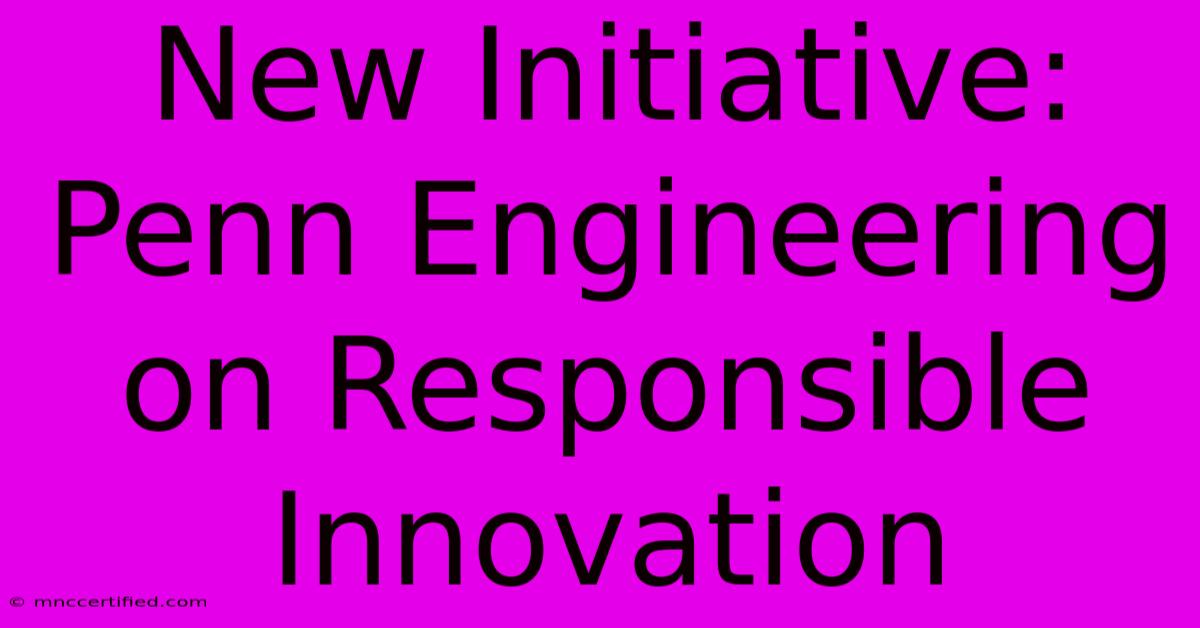New Initiative: Penn Engineering On Responsible Innovation

Table of Contents
New Initiative: Penn Engineering on Responsible Innovation
The University of Pennsylvania's School of Engineering and Applied Science (Penn Engineering) has launched a groundbreaking new initiative focused on Responsible Innovation. This commitment signifies a crucial shift in engineering education and practice, emphasizing ethical considerations and societal impact alongside technological advancement. This article delves into the details of this exciting initiative, exploring its goals, impact, and the broader implications for the future of engineering.
What is Responsible Innovation?
Responsible Innovation isn't simply about avoiding harm; it's about proactively designing and developing technologies that benefit society while minimizing potential risks. It involves a multifaceted approach that considers:
- Ethical implications: Addressing questions of fairness, justice, privacy, and security related to new technologies.
- Social impact: Assessing the broader societal consequences of innovations, both positive and negative.
- Environmental sustainability: Minimizing the environmental footprint of technological advancements.
- Inclusivity and accessibility: Ensuring that innovations benefit all members of society, regardless of background or ability.
Penn Engineering's Commitment to Responsible Innovation
Penn Engineering's initiative is multifaceted and ambitious. It includes:
1. Curriculum Integration:
The school is integrating responsible innovation principles into its existing curriculum. This means that students across all engineering disciplines will receive training in ethical decision-making, societal impact assessment, and sustainable design practices. This isn't just an add-on; it's a fundamental shift in how engineers are trained.
2. Research Funding:
Penn Engineering is dedicating resources to research projects explicitly focused on the ethical and societal implications of emerging technologies. This fosters a culture of critical inquiry and encourages researchers to consider the broader context of their work. Keywords like ethical AI, sustainable engineering, and responsible technology development will be central to funded projects.
3. Community Engagement:
The initiative emphasizes engagement with the wider community. This includes collaborating with stakeholders, including policymakers, industry leaders, and community groups, to ensure that innovations are developed responsibly and meet societal needs. This community-based approach to innovation is crucial for ensuring that technologies are beneficial and accessible to all.
4. Faculty Development:
Penn Engineering is investing in faculty development programs to equip instructors with the knowledge and skills to effectively teach responsible innovation principles. This ensures consistent implementation across all programs and strengthens the school's overall commitment.
The Broader Impact
This initiative has significant implications for the future of engineering and technology. By prioritizing responsible innovation, Penn Engineering is:
- Cultivating a new generation of ethical engineers: Graduates will be equipped to navigate the complex ethical dilemmas inherent in technological advancement.
- Promoting technological innovation that benefits society: The focus on societal impact ensures that technologies are developed to address real-world challenges and improve lives.
- Building trust in technology: By addressing ethical concerns proactively, the initiative fosters greater public trust in engineering and technological innovation.
- Setting a new standard for engineering education: Penn Engineering’s leadership in this area is likely to influence other institutions, promoting a widespread adoption of responsible innovation principles.
Conclusion: A Path Towards a Better Future
Penn Engineering's initiative on Responsible Innovation represents a significant step towards a future where technological advancement is guided by ethical considerations and societal well-being. This proactive approach sets a powerful example and demonstrates the critical role of engineering in building a more just, equitable, and sustainable world. The integration of responsible innovation principles throughout their curriculum and research endeavors positions Penn Engineering as a leader in shaping the future of engineering education and practice. The long-term impact of this initiative will undoubtedly be significant, shaping not only the work of Penn Engineering graduates but also the broader technological landscape for years to come.

Thank you for visiting our website wich cover about New Initiative: Penn Engineering On Responsible Innovation. We hope the information provided has been useful to you. Feel free to contact us if you have any questions or need further assistance. See you next time and dont miss to bookmark.
Featured Posts
-
Premier Access Insurance Company
Nov 22, 2024
-
Judge Overturns Smollett Verdict
Nov 22, 2024
-
Ukraine Russia Icbm Us Capability
Nov 22, 2024
-
Russias Missile Attack On Ukraine Confirmed
Nov 22, 2024
-
Ukraine Attack Putin On New Missile Use
Nov 22, 2024